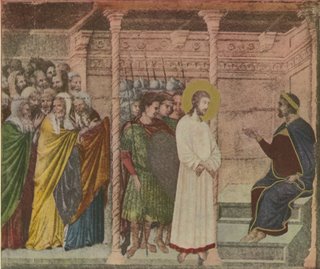
Two men in a room.
One man, dressed in the crisp white linen of the ruling classes, the official representative of the Roman Emperor, the self-proclaimed Kurios of all the world.
The other man -- dirty, beaten, bloody, weak -- the real Kurios of all; the one in whom and for whom and through whom all things were made and in whom all things hold together.
Two worlds colliding.
The scandal of Christianity, then as now, is that Christians claim the second man, and not the first, as their Lord. That's the party line, anyway.
The reality? Christians find the power of the first man strangely seductive; something that they themselves often long to achieve. Throughout the centuries, "winning the world for Christ" has, more often than not, simply meant winning the world -- claiming and exploiting the world's resources; subjugating, marginalizing, sometimes forcibly converting, sometimes killing non-Christians; gaining political and cultural supremacy.
But throughout the centuries, that image of two men in a room still confronts us; still disturbs us.
Our king -- the king whom we claim to long for in our Advent hymns, the king whose birth we celebrate at Christmas and whose revealing we rejoice in at Epiphany, is a king whose crown and scepter and robe are instruments of torture and mockery, given to him by those whose ultimate loyalty is to Kurios of this world and the values of that reign.
When our king says, "Follow me," he asks us to follow him into that place where worlds collide; where his kingship is at best sentimentalized and dismissed, at worst actively and violently opposed.
We hesitate. We don't really want a king whose power is in weakness, whose victory is in defeat.
But our Kurios, unlike the other, is not a king "up there" or "out there," apart from his subjects. He is a king who not only goes before us to show us the way, but who stands beside us in solidarity with our own pain and weakness and defeat, and who stands behind us, to comfort and encourage us. He's a king who conquers not through the love of power, but through the power of love. And he begins his conquest in our hearts.
All hail the King of All -- the King who stoops to conquer.
artwork: "Christ Before Pilate," Duccio di Buoninsegna
3 comments:
loved this :)
oh, how I wish I could write like this. This is beautiful and poignant and true and way better than the sermon I ended up with. Keep up the good work....
Oh, superb, LC! Truly he is the one King worthy to be followed - only his greatest knights are dressed in rags...
Post a Comment